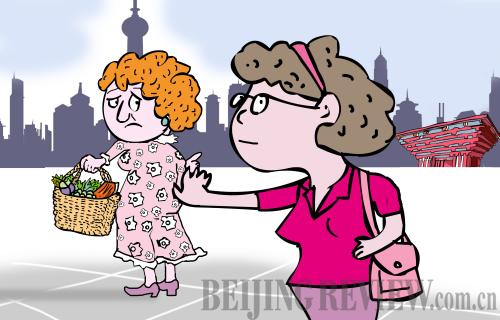|
 |
|
(LI SHIGONG) |
You may recall the media reported at the beginning of this year a strange new global phenomenon—the pajama ban. It started in Cardiff, in Wales in the United Kingdom, in January. A Tesco supermarket in the St Mellon area of Cardiff escorted an indignant Elaine Carmody off its premises after she violated a new dress code prohibiting people from shopping in their nightwear. "If you're allowed to wear jogging bottoms," The Times reported her as saying, "why aren't you allowed to wear your pajamas in there? It's ridiculous and stupid!" Tesco retorted the rules had been imposed following complaints from members of the public who found the sight of people in their pajamas "uncomfortable" and "embarrassing."
Meanwhile in Shanghai a similar ban was imposed—but this time in the name of modernization and civilized behavior. Pajama-wearing in public, it was suggested, goes against the rules of international etiquette. A city modern enough to host the World Expo should be ashamed to be seen out in its nightwear. Foreigners will laugh. It looks backward. Media reports talked of teams of volunteers going round the streets and lurking at gates in residential districts to persuade pajama wearers to go home and change before they hit the supermarket. Officials from residents' committees extolled the virtues of a more modern approach. Netizens were polled for their opinions. Even one academic who felt people should have the personal freedom to choose made it clear that of course he personally would never dream of wearing such garments.
But Shanghai people have a long and honorable tradition of wearing their pajamas out. Padded in winter, short and floral in summer, they are an everyday sight in the alleys and residential parts of Shanghai—along with rolled up vests and plastic chairs.
"I take no notice!" said 62-year-old Mrs. Zhang (resplendent in a pair of red padded tartan PJs and pink trainers) when I spoke to her. Her friend Mrs. Liu (pale blue and pink check flannelette and green sandals) agreed. "We are Chinese and this is what we do. I'm not going to change because of what foreigners think—what do they know? Pajamas are comfortable and convenient."
I'd taken it upon myself during a recent weekend in Shanghai to check out how effective the ban has been. For the first couple of hours I really thought the self-appointed pajama police had been effective: Xintiandi—no sightings. None on Xizang Zhong Road. None in the Raffles shopping mall. None on the Bund. But then—walking up from the Bund toward Hankou Road—there they were! Blue and white stripes and hair rollers coming out of a little grocer's shop. Red with white puppies arm in arm with large purple flowers. And an elderly male dog walker in flip-flops, baggy white pajama bottoms and what looked (to the untrained Western eye) suspiciously like his wife's green floral pajama jacket.
I smiled rather than laughed. For me, much of the character of a place resides in the quirks of its residents, their idiosyncrasies and the ways in which they are unique. One of the dangers of globalization—and the type of modern urban living the Shanghai Expo celebrates—is it can result in a global conformity where individualism and local culture are swept away in a desire to appear uniformly "modern" (whatever that might mean). Mrs. Zhang and Mrs. Liu, however, seemed to be immune to such contemporary pressure. I asked them whether there were places they wouldn't be happy to wear their pajamas. Both looked at me rather pityingly. Of course they wouldn't wear them to go anywhere important or anywhere upper class people might be critical. But for a quick walk down to the shops, walking the dog or doing the chores there were no better garments. Practical, comfortable and washable—that was what they were. And they covered you decently. This with a disparaging look at a young girl in shorts walking past.
Had anyone tried to persuade them to give them up, I wondered. Mrs. Zhang laughed. Some children had annoyed her for about a week but she had stumped them by asking them what she should wear instead—"You wouldn't want to see an old thing like me in jeans and a T-shirt, would you?"
I'm with Mrs. Zhang and Mrs. Liu. Why shouldn't they wear their comfortable pajamas? They have the common sense not to wear them on high days and holidays, or where they might offend the delicate sensibilities of local bureaucrats trying to present an unreal and air-brushed version of modern Shanghai.
There is no rule book to say that the world should conform to Western habits of dress: It would be a less interesting place for being less diverse. If I stayed in Shanghai a little longer, I could even see myself acquiring a pair of smart pajamas, tartan possibly, or with little penguins...
The next time I'm back in the UK, Tesco had better watch out!
The author is a British researcher working in China | 